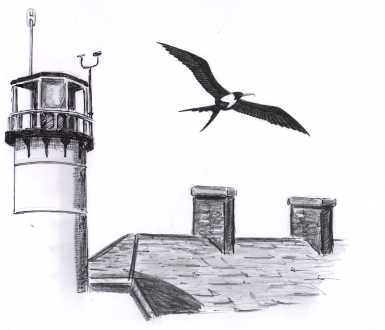
Dear Bird Folks,
Last week, above my home in Chatham Center, I saw this big bird soaring like a kite. It was all black with a white belly, a long forked tail and it hung in the sky for hours. My friend told me that a rare bird had been seen in town. Was that the big black bird I saw? Why did it just hang over Chatham Center?
Maureen, Chatham
Hey Maureen,
The way I hear it, hangovers are a common thing in Chatham Center, but maybe that’s just with my friends. The bird that you had over your house is, indeed, unusual. This bird has only been seen about a dozen times ever before in Massachusetts. What you saw was a “Magnificent Frigatebird” and that is really its name. I know saying “frigatebird” sounds more like an expression people yell out the car window after being cut off at a rotary, but it is a real bird.
Chatham is one of the best towns on the east coast for spotting rare birds. Each year several seldom seen birds make an appearance in Chatham. However, most of them are found out on the foggy beaches of Monomoy or South Beach where they are only seen by birders, fishermen or rumrunners. What was nice about this rare frigatebird, was it hung over the middle of town for all to see if anyone happened to look up.
Most of us are familiar with the male frigatebirds from those endless shows on the Galapagos that PBS runs on a daily basis. They are the birds with the bright red throat pouch that inflates like a balloon during courtship. The bird that you saw in Chatham was a female so it did not have the throat pouch, but it was still an amazing sighting.
Frigatebirds are large but odd seabirds. I say large because their wingspan is almost eight feet long! They are odd because they only weigh a few pounds. To give you an idea of how odd that is, Mute Swans also have an eight foot wingspan, yet they weigh close to fifty pounds. Such a light bird can easily spend hours effortlessly floating over one spot.
Another odd thing is that a frigatebird is a seabird yet it hates water, and with good reason. If it happens to land in water, it wiil probably die. Frigatebirds have these silly little feet and legs that are not powerful enough to help it take off from water. Plus, unlike other seabirds, its feathers can easily become water logged if allowed to be in water for too long. So a frigatebird in the water will quickly become fish food unless it can make it to shore and borrow a hair dryer.
Once airborne, the frigatebird is master. Like you observed, the frigatebird can hang in the air motionless for hours and then suddenly blast off with the speed and agility of a swallow. They often chase gulls relentlessly until the gulls cough up whatever food they have eaten. The frigatebird then snags the hacked-up food in midair and chows it down. Yum! If there are no gulls around to pick on, frigatebirds are more than capable of finding their own food. Using their excellent eyesight, they find and pluck fish out of the ocean, while being careful not to land on the water.
Magnificent Frigatebirds are not rare, but they are rare this far north. Most of the time frigatebirds are found in the Caribbean, with visits to Florida and the Gulf coast. Again, unlike most seabirds, frigatebirds don’t move around very much. They don’t often stray far from where they were born. That is why it was such a treat to see one this far north.
Congratulations on that rare sighting, Maureen. I’d write more but PBS is showing a special on the Galapagos and I’d hate to miss it.